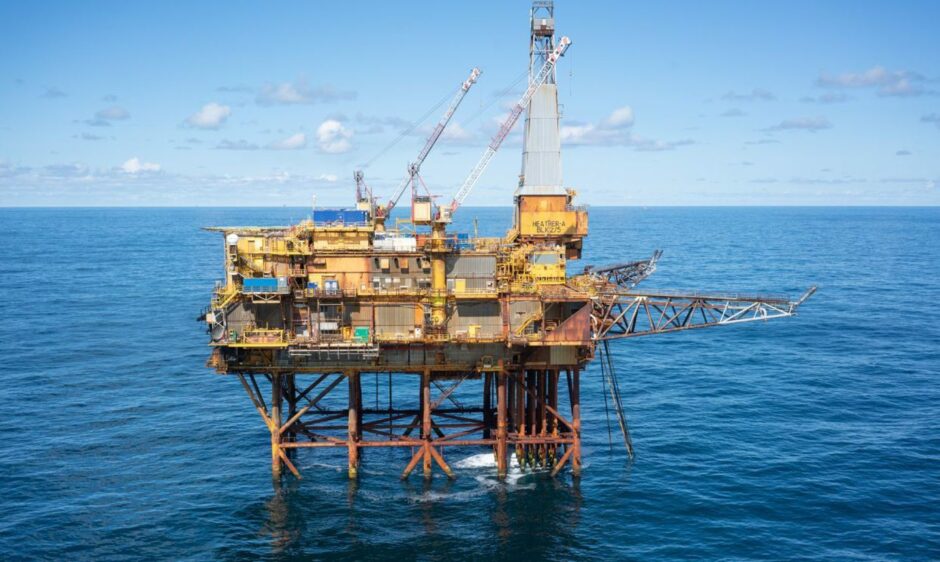
The EnQuest (LON: ENQ) Heather oil and gas platform will go to Denmark for decommissioning, with a key contract handed out to a yard today.
Modern American Recycling Services Europe (MARS) in Frederikshavn has been awarded the work by Allseas for the Heather Alpha topsides.
One of the oldest installations in the North Sea, removal of the EnQuest platform will see the end of Heather after 45 years of production.
The MARS award covers management and engineering, receipt with load-in assistance, dismantling and disposal for the EnQuest platform.
MARS has not disclosed a value for the contract and has told Energy Voice that the work will not create any additional jobs.
Headquartered in Gibson, Louisiana, MARS has a facility in Frederikshavn, Northern Denmark.
‘Yet another’ UK asset going overseas
Jim Rae, an independent decommissioning consultant who has worked for a number of North Sea operators, lambasted the announcement of the contract on LinkedIn.
Mr Rae wrote: “Yet another UK Sector platform deconstruction contract going to a specialist yard overseas.”
He added: “UK plc has only secured a smaller proportion of such work in recent years than has gone elsewhere creating local economic benefits in Norway and Denmark notably.”
In recent years a number of UK infrastructure decommissioning projects have been carried out by yards in Denmark.
BP’s Foinaven FPSO which operated off Shetland for 25 years also went to the MARS facility overseas last year, much like Teekay’s Banff FPSO.
The UK’s largest producer of oil and gas, Harbour Energy, also sent its Balmoral platform to Denmark in 2021.
The decommissioning consultant noted that UK supply chain firms and the communities around them are “losing out on economic activity generated from the UKCS.”
However, last year Energy Voice reported that British yards have won dismantling for 26 of the 39 oil and gas assets removed from the UK North Sea between 2018-2021.
That includes a series of heavy, high-value assets like the Brent and Ninian platforms, alongside smaller prizes like the dozen V-field assets from Harbour Energy’s Southern North Sea portfolio.
In response to these figures, Will Rowley, chief executive of Offshore Solutions Group and former head of industry body Decom North Sea (now Decom Mission) described the UK as a decommissioning “powerhouse”.
Mr Rowley said: “Whether with rigs (Well-Safe) or rigless (Acteon/Claxton), the UK sector is the technical and innovative powerhouse in well P&A.
“A rough estimate would put the UK position at >60% of the entire North Sea (UK, Norway, Netherlands). As the number of wells increase then this ratio should be maintained.”
Additionally, the North Sea Transition Authority (NSTA) estimated 150-200 wells will be fully decommissioned each year over the next five years, at an annual spend of £700m – £1bn.
Looking across the sector, the NSTA predicts £20 billion of spending on decommissioning between now and 2031, with 46% of that cost accounted for by P&A of wells.
Heather Alpha decommissioning
Allseas will deploy the Pioneering Spirit vessel and will use its topsides lift system, capable of lifting 48,000 tonnes, to remove the EnQuest topsides in a single lift operation.
Preparations for the lift will begin next year, with the lift itself scheduled for 2025.
Following the lift operation, MARS will be responsible for recycling the platform.
Heather Alpha stands around 245 miles north-east of Aberdeen and weighs nearly 13,000 tonnes.
EnQuest has a 37.5% decommissioning liability after acquiring the asset in 2010, Ithaca Energy and Shell each hold 31.25% in the asset.
Initially installed in 1977, a fire in Heather Alpha’s compressor module in October 2019 ultimately led EnQuest to make the decision to close the curtains on this asset following 45 years of production in the North Sea.
In March 2020 after the fire, EnQuest made the decision due to the cost of repairs.
Shetland is the nearest UK coastline for Heather, which lies 58 miles to the north-east.
Production began in 1978, reaching a peak of 36,000 barrels of oil equivalent per day in 1982.
For a time, post-cessation of production, Heather was being used as like an “Airbnb” as part of up manning plans for northern North Sea neighbour platform Thistle.
Recommended for you

